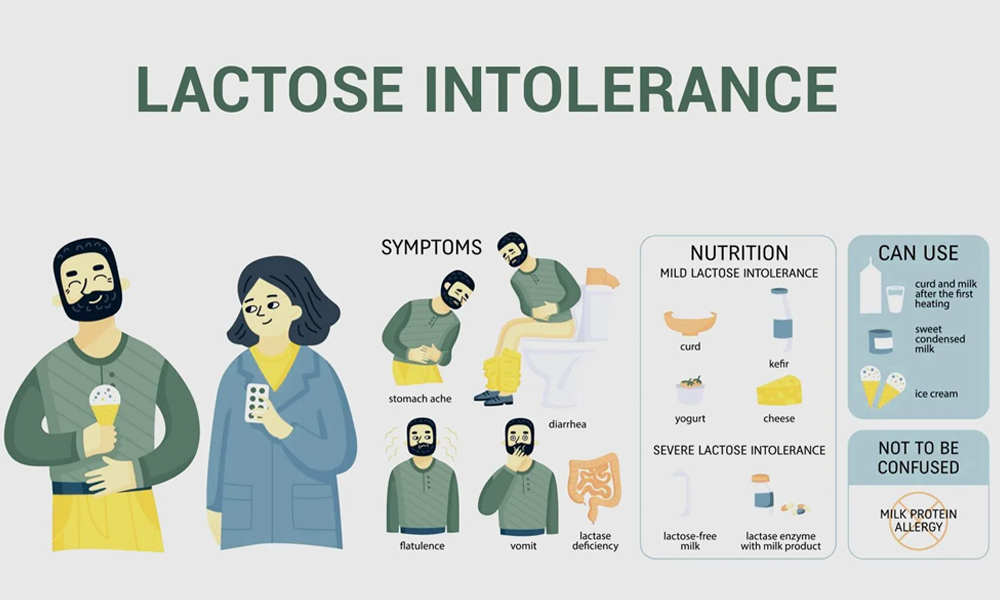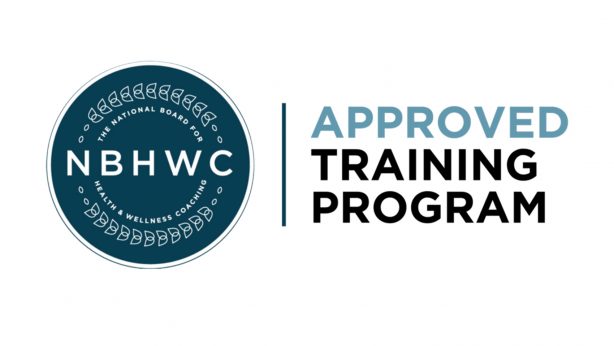
Table of Content |
Food sensitivities are getting more and more common these days with 25% of Indian population now showing allergic or sensitivity reactions to foods. It would not be an exaggeration to say that it’s possible that most of us have a sensitive reaction to some foods and we don’t even know it.
What is Lactose Intolerance

One such intolerance is lactose intolerance, which is fairly simple to detect most times. Lactose is a natural sugar found in milk and other dairy products. Lactose intolerance occurs when one has a shortage of an enzyme called Lactase in their body. In a normal individual the lactose in the milk gets broken down into its simpler components in the small intestine with the help of the enzyme lactase and gets absorbed into the blood stream. When there is lack of sufficient lactase in the body, the body is incapable to absorb lactose, and the lactose lands up in the large intestine where it is fermented by the bacterial colony hence causing symptoms such as nausea, cramps, diarrhoea, bloating and gas.
Symptoms of Lactose Intolerance

Lactose intolerance manifests through various digestive symptoms that occur after consuming lactose-containing foods or beverages. Common Lactose intolerance symptoms include:
- Abdominal Pain: Individuals may experience cramping or discomfort in the abdominal region, often shortly after consuming lactose.
- Bloating: Lactose intolerance can cause bloating, characterized by a feeling of fullness or swelling in the abdomen due to excess gas production.
- Flatulence: Excessive gas production in the digestive tract can lead to increased flatulence, resulting in the passage of gas through the rectum.
- Diarrhea: Lactose intolerance can trigger loose stools or diarrhea, often accompanied by urgency and frequent bowel movements.
- Nausea: Some individuals may experience feelings of nausea or queasiness after consuming lactose-containing foods.
- Cramps: Abdominal cramps or spasms may occur as a result of the body’s inability to digest lactose properly.
These symptoms can vary in severity and onset time, depending on individual tolerance levels and the amount of lactose consumed.
Causes of Lactose Intolerance

Lactose intolerance occurs when the body is unable to digest lactose, a sugar found in milk and dairy products, due to insufficient levels of lactase enzyme in the small intestine. The primary causes of lactose intolerance is a deficiency of lactase enzyme activity, which can be attributed to genetic factors, ethnicity, or certain medical conditions.
- Primary Lactase Deficiency: This is the most common cause of lactose intolerance and occurs when lactase production decreases naturally with age, typically during adolescence or adulthood.
- Secondary Lactase Deficiency: This form of lactose intolerance occurs as a result of damage to the small intestine, such as from gastrointestinal infections, celiac disease, or other digestive disorders.
- Congenital Lactase Deficiency: Rarely, infants are born with a genetic condition called congenital lactase deficiency, which causes a complete absence of lactase enzyme from birth.
- Developmental Lactase Deficiency: Premature infants may experience temporary lactose intolerance due to underdeveloped digestive systems, which can improve as they grow and mature.
These factors can lead to symptoms such as abdominal pain, bloating, gas, diarrhoea, and nausea after consuming lactose-containing foods or beverages.
Breaking down lactose in infants is mostly not a problem. The problem becomes more severe in later years when the enzymes levels slowly drop. Lactose intolerance can also occur when the intestine lining is damaged or injured. This happens mostly in the case of stomach flu, chemotherapy, radiation and other intestinal illnesses.
Treatment of Lactose Intolerance

Several Treatment of lactose intolerance and strategies can help alleviate the symptoms of lactose intolerance:
- Lactase Enzyme Supplements: Taking lactase enzyme supplements before consuming lactose-containing foods can help break down lactose and reduce digestive discomfort.
- Lactose-Free or Low-Lactose Diet: Avoiding or reducing the consumption of dairy products and opting for lactose-free alternatives such as almond milk, lactose-free yogurt, and dairy-free cheese can alleviate symptoms.
- Gradual Introduction: Gradually reintroducing small amounts of lactose-containing foods into the diet may help some individuals tolerate lactose better over time.
- Probiotics: Consuming probiotic supplements or foods containing beneficial bacteria may aid in improving lactose digestion and reducing symptoms.
- Lactose-Free Medications: Some over-the-counter medications containing lactase enzymes can help alleviate symptoms when consuming lactose-containing foods.
- Consultation with a Healthcare Professional: Seeking guidance from a healthcare provider or registered dietitian can help develop personalized dietary strategies and management plans tailored to individual needs and preferences.
Types of Lactose-Containing Foods

For individuals with lactose intolerance, certain foods can trigger symptoms such as bloating, gas, and diarrhea due to their high lactose content. Common lactose-containing foods to avoid or consume in moderation include:
- Dairy products: Milk, cheese, yogurt, ice cream, and butter can trigger the symptoms. It’s advisable to opt for lactose-free alternatives such as almond milk, lactose-free yogurt, and dairy-free cheese to avoid discomfort.
- Processed foods: Processed foods often contain hidden lactose, making them problematic for individuals with lactose intolerance. Examples include baked goods, processed meats, instant soups, and creamy sauces. It’s important for those with lactose intolerance to carefully read ingredient labels and opt for lactose-free or dairy-free alternatives to avoid discomfort.
- Processed meats: Processed meats, such as sausage, deli meats, and bacon, may contain lactose as an additive. For individuals with lactose intolerance, consuming processed meats can lead to digestive discomfort. It’s crucial to check ingredient labels and choose lactose-free options or alternatives to avoid triggering symptoms.
- Desserts: Desserts like custards, puddings, and creamy desserts often contain lactose, making them unsuitable for individuals with lactose intolerance. Consuming such desserts can lead to digestive discomfort. Opting for lactose-free dessert alternatives or homemade treats using dairy-free ingredients is recommended for those with lactose intolerance.
- Instant soups and sauces: Instant soups and sauces may contain lactose as an additive, posing challenges for individuals with lactose intolerance. Consuming these products can lead to digestive discomfort and symptoms such as bloating and diarrhea. It’s essential for individuals with lactose intolerance to carefully read ingredient labels and opt for lactose-free or dairy-free alternatives to avoid triggering adverse reactions.
Choosing lactose-free alternatives or using lactase enzyme supplements can help manage lactose intolerance while still enjoying a varied diet. Get treatments for lactose-intolerance now.
Conclusion
Lactose intolerance is a common condition characterized by the body’s inability to digest lactose, the sugar found in dairy products. Individuals with lactose intolerance symptoms can experience digestive discomfort when consuming lactose-containing foods. Managing lactose intolerance involves avoiding or minimizing the intake of dairy products and opting for lactose-free alternatives to prevent symptoms and maintain overall digestive health. Looking out for signs and symptoms of lactose intolerance and consulting a healthcare professional for personalized dietary recommendations is advisable for effective management.
Visit your Weljii Health and Wellness Coach for further assistance. Weljii Health and Wellness Coaches besides being behaviour change experts are also trained on nutrition and will not only guide you to eat well and develop a diet plan but will also help you bring about the necessary lifestyle changes in a holistic manner.
Liked this content? Wish to know more about a career in health and wellness coaching? Get in touch with us at +91- 8448449481
Frequenlty Asked Questions
Q1. What foods to avoid if you are lactose intolerant?
Ans: If you are lactose intolerant, it’s essential to avoid or minimize the intake of lactose-containing foods, including dairy products such as milk, cheese, yogurt, and ice cream. Additionally, processed foods like baked goods, instant soups, creamy sauces, and certain medications may contain hidden lactose. Opting for lactose-free or dairy-free alternatives can help prevent symptoms and promote digestive comfort.
Q2. How is lactose intolerance diagnosed?
Ans: Lactose intolerance is typically diagnosed through a combination of medical history, physical examination, and diagnostic tests. The lactose tolerance test involves drinking a liquid containing lactose followed by measuring blood glucose levels to assess lactose digestion. Another method is the hydrogen breath test, which measures hydrogen levels in the breath after consuming lactose. Genetic testing and elimination diets may also be used to confirm lactose intolerance. Consulting a healthcare professional is recommended for accurate diagnosis and management.
Q3. Can lactose intolerance develop at any age?
Ans: Yes, lactose intolerance can develop at any age. While some individuals may experience symptoms early in life, others may develop lactose intolerance later in adulthood. Factors such as genetics, ethnicity, and underlying medical conditions can influence the onset of lactose intolerance. Consulting a healthcare professional for evaluation and diagnosis is essential if symptoms of lactose intolerance develop at any age.
Q4. Is lactose intolerance common?
Ans: Yes, lactose intolerance is a common condition worldwide. It affects individuals of all ages and ethnicities, although prevalence rates may vary among different populations. Estimates suggest that a significant portion of the global population experiences some degree of lactose intolerance, with higher prevalence observed in certain ethnic groups. Understanding the prevalence and symptoms of lactose intolerance is important for effective management and dietary adjustments.
Q5. Can lactose intolerance cause long-term health problems?
Ans: Lactose intolerance typically does not cause long-term health problems. However, untreated symptoms such as chronic diarrhea or malabsorption of nutrients may lead to nutritional deficiencies or other complications over time. It’s important to manage lactose intolerance through dietary modifications and symptom relief measures to prevent potential health issues and maintain overall well-being. Consulting a healthcare professional for personalized guidance is advisable.


